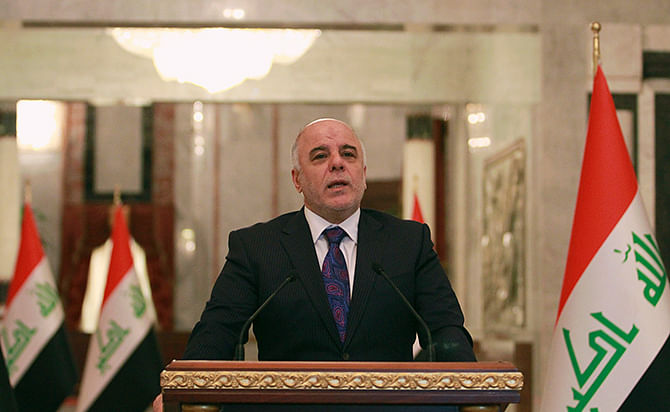Mosque suicide bomber kills 13 in Baghdad
Mosque suicide bomber kills 13 in Baghdad

Shortly after Iraq’s new prime minister-designate called for national unity at his first official news conference on Monday, a man wearing an explosive vest detonated himself inside a Shiite mosque here, killing 13 people and underscoring the great challenges the country’s leaders face in trying to hold the country together, reports The New York Times.

Haider al-Abadi, the prime minister-designate, is negotiating with political blocs and has until September 11 to submit a list of proposed ministers to Parliament for approval under a deadline set by the Iraqi Constitution.
The United States has called the formation of an inclusive government the first step in addressing Iraq’s many problems, which include overhauling the security forces and battling the Islamic State in Iraq and Syria, or ISIS, a jihadist group that has taken over large parts of the country.
Speaking to reporters, Abadi said that he had been engaged in “productive” discussions with the political blocs and that he would present a mission statement for the new government in the next two days.
“We seek to form a government capable of directing the country’s abilities in the right direction, uniting national efforts and integrating all abilities and skills,” he said.
“We face a fierce enemy, which is terrorism,” Abadi said of ISIS. “This terror confronts all Iraqis, the region and in fact the whole world.”
The United Nations’ high commissioner for human rights, Navi Pillay, said in Geneva on Monday that ISIS and associated forces had committed acts that might amount to crimes against humanity along with a wide range of “horrific” human rights abuses.
The militants “are systematically targeting men, women and children based on their ethnic, religious or sectarian affiliation and are ruthlessly carrying out widespread ethnic and religious cleansing in the areas under their control,” she said. ISIS forces had directly targeted Christians, Yezidi, Shabak, Turkmen, Kaka’e and Sabaean minorities, Pillay said, citing targeted killings, forced conversions, abductions, trafficking, slavery, sexual abuse and destruction of places of religious and cultural significance.
Since mid-June, around 13,000 Turkmen, including 10,000 women and children, have been besieged by ISIS in Salah al-Din, a governorate northwest of Baghdad, “and there are fears of a possible imminent massacre,” she warned.
In a statement that puts on official record events reported in the news media, Pillay said ISIS forces had killed hundreds of people mainly from the Yezidi minority and abducted some 2,500 others in Nineveh governorate at the beginning of August. Hundreds more from the Sinjar area were killed and abducted later in the month, she said.
Men who refused to convert to Islam were executed and women and children were handed over to ISIS fighters as slaves or were threatened with being sold, Pillay reported.
The United Nations has verified reports of a massacre at Badoush Prison in Mosul in early June, Pillay said, when ISIS gunmen took 1,000 to 1,500 prisoners to an uninhabited area nearby, separated the Sunni men, and forced the others to kneel in four rows before opening fire on them. Up to 670 prisoners were reported killed, Pillay said.
“Such coldblooded, systematic and intentional killings of civilians, after singling them out for their religious affiliation, may amount to war crimes and crimes against humanity,” she said.
To help combat ISIS, Abadi, the prime minister-designate, said he planned to increase support for groups of armed citizens who defend their areas, but he said they could operate only under the umbrella of the official security forces.
The violence on Monday underlined the challenges that any new government will face. The suicide attack struck a Shiite mosque in the neighbourhood of New Baghdad during the afternoon prayer.